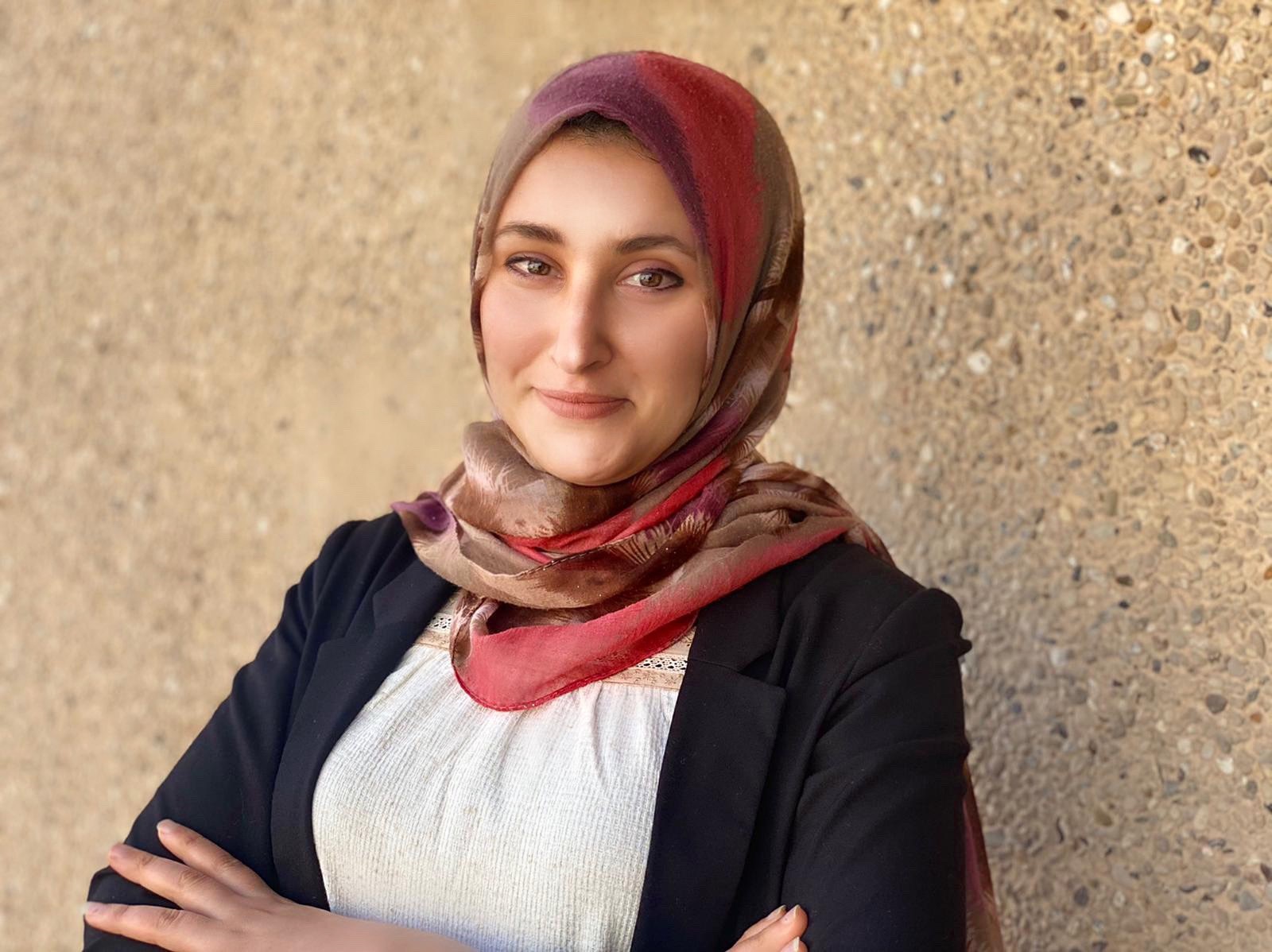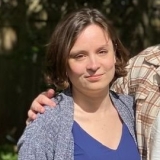
Last year, AFSC brought together perspectives from Palestinian writers from Gaza in the book, "Light in Gaza: Writings Born of Fire.” The anthology features essays and poems of 11 Palestinian writers from Gaza to people around the world.
Recently, AFSC’s Shireen Akram-Boshar interviewed contributor Asmaa Abu Mezied. Asmaa is an economic development and social inclusion specialist working to address issues of gender, development, and climate change in the agriculture sector of Gaza.
Shireen: Can you tell us about the process of writing these pieces?
Asmaa: When I heard about the anthology, I appreciated that there would finally be varying content written by Palestinians from Gaza on Gaza. That's not something you see often. But to be honest, I didn't think that I had the qualifications to write a piece. I think that came from the idea that we are not good enough, that our narratives and our voices cannot be told as they are.
I wrote the shorter piece during the May 2021 aggression on Gaza. Writing was my only outlet to deal with all the emotion, the heartbreak, the experiences we were going through. I felt like if I was not writing, I was going to suffocate.
I watched a video of two girls who were recording when they fled the Susi tower. And I understood why they recorded the moment. Whenever you look at social media comments about a video or picture that comes from Gaza during attacks, people in the comments say, “oh my God, it's so fake, how could someone continue to hold their phones and record while being bombed.” But recording isn’t a luxury. You are thinking about survival while you are recording, because this is preserving our own voice. If there is no recording, then our stories are erased.
Writing the chapter on agriculture and Palestinian identity and peasantry and the environment was eye-opening for me, even though I work on agriculture. Before this, I couldn't understand why the older generation pays so much attachment to the land. Why selling one's land is considered impossible; it's not even put into question. I always remembered this from my grandmother.
I couldn't understand this because when you talk about Gaza’s context now, even to have food on your table is a struggle. What's the point of having a piece of land when you can’t eat?! The process of writing this piece made me understand why it's important, why even though people didn't have much to eat, selling land was not an option because it's part of who they are.
This is why Israel has worked systematically to uproot that kind of identity.
Shireen: In one of your pieces, you talk about keeping a Palestinian narrative alive—while not falling into the demonization and victim-blaming you see so often in Western media. Could you talk more about that?
Asmaa: I'm proud that there have been a lot of voices that pinpoint the problematic way that media treats Palestinians. When I look at the last Israeli assault on Gaza, for example, I'm really proud that there are so many Palestinians who are refusing to be complicit in that media. I know a lot of my friends who would receive calls for interviews from very well-known journals and news channels, and would say, show me the questions first. Tell me who's going to be part of the interview. And that was not something you would see in 2008 or 2014, because we so desperately wanted our voices to be heard. That shifted a little with social media, but there’s still a very dominant culture of putting you in a corner where you have to justify everything. That is completely mentally and physically draining and so dehumanizing for us.
There is this constant message that we need to prove that we are human. As if we need to prove that we are human enough to be worthy of being acknowledged.
Shireen: In your other piece, you speak about a long history of Palestinian connection to the land, exhibited through folklore and other traditions. Why did you find this important to talk about?
Asmaa: If you look at most of the literature about Palestine and agriculture, you will find that there isn't much written about Gaza. Most of the literature and stories take examples from the West Bank. But what about the narrative of Gaza? The tales that my grandparents used to tell me; the tales of the elderly that I used to hear when we visited farmers.
In Gaza, we have a nature reserve, it's called Wadi Gaza. My grandparents told me that they used to see deer there. I've never seen deer in my life in Gaza. The only thing I see is birds. But the idea that this place was a place that they used to go and enjoy as a natural reserve—when the memory I have of that natural reserve is really the bad smell that comes with the sewage that's being dumped there—is something that I couldn't find. I felt the need to go back in history and understand and look at what the area was.
We are also often reminded of the time of citrus trees in Gaza. I wanted to dig deeper into that. I felt like this is something we really need to hear, how Gaza and its agricultural identity evolved throughout the decades.
Shireen: Israel has long promoted the myth that it “made the desert bloom;” that it cultivated neglected land. It continues this myth today with what we call “greenwashing,” its claim that it is unique in the region in protecting the environment. Your chapter makes it clear that this is untrue.
Asmaa: Just looking into the records of, for example, the British consulate, about how crops used to be exported from Gaza to Europe and elsewhere, different countries around the world. They show that Palestinian agriculture was a booming sector. It was an agricultural land that used to produce a lot of crops with high demand globally. The production records show this.
That myth, of Palestine being a desert, has been fundamental for the Israeli narrative, because it helps justify their coming here. Israel has always maintained a connection to agriculture, through different Israeli settlements and agricultural work. At the beginning of the 20th century, they were trying to convince people to get into agriculture. Now, the number of people who are engaged in agricultural labor or agricultural farming is large in Israel, because that is something that maintains their relationship to the land.
On the Palestinian side, through Israeli economic and occupation policies, agriculture has become no longer even a survival mechanism for Palestinian families. People are trying to move away from agriculture in Gaza. I haven’t done research in the West Bank, but you can see it there clearly also. There are constant attacks on Palestinian olive trees while Israeli settlers plant olive trees and try to make it a symbol that represents their existence.
Visualizing Palestine has released infographics about the environment and climate change in Palestine. One of them is about greenwashing. It’s a resource that people can look at because it explores how, while claiming that they are trying to preserve natural reserves in Palestine, Israel is confiscating Palestinian lands and displacing communities.
Shireen: In your work, you focus on the intersection of gender and development in agriculture, and on the “care economy” and women’s collective organizing. Could you speak more about that?
Asmaa: The care economy is working to undermine the root causes of how capitalism exists. Because capitalism does not acknowledge that women do so much labor. That labor is invisible, it does not get any recognition, any valuation. For example, the amount of labor that women do within the household, from cleaning to doing laundry, teaching the children, taking care of the elderly, all of this labor, if women decided to stop working, what will happen?
The care economy tries to put a spotlight onto that work. And we are not simply speaking about the redistribution of that labor between men and men. We are also talking about the government’s responsibility, the private sector that takes so much of our time and labor and years of our lives but does not provide us with welfare and the mechanisms to have a life that is dignified, that is comfortable. This is an area that I have been working on in Palestine.
I also look at how women in the agricultural sector work, the opportunities that exist, the different examples of how women try to find economic opportunities for themselves, and the challenges in this process. And when you zoom into Gaza, women not only have to deal with financial challenges, but also have the mental health challenges of experiencing all of what they have experienced so far, and then having to care for their family members who are also suffering from trauma. Women are expected to shoulder all of that while also not complaining.
When I lived in the U.S. for a year and a half, I was exposed to spaces where I got to know more about women of color and Black women and their struggles. My closest friends were women from different countries, and the conversations we had were eye-opening. Coming back to Gaza, I tried to fit all of this into an understanding of our daily lives. That kind of knowledge, the exposure that I got, enabled me to put words to it and explain why this is happening, that these are the systems behind these experiences.
Shireen: What would you like people to know about you as an individual?
Asmaa: What I would like people to know about me is that I'm someone who tries to be a gardener, but realizes through the process that gardening is very hard work. And that makes me appreciate what I do. I am a feminist and I'm proud of working with Palestinian women and highlighting the issues they work on, experience, and suffer from. And I'm also a dreamer in a sense, it sounds cliche, but I am a believer in the need for global solidarity to achieve change.
Shireen: Is there anything else you would like to add?
Asmaa: I'm very proud to have been through this experience in contributing to the book. It taught me a lot about who I am and humbled me; it made me realize that there are so many things that we need to do that we haven't even talked about. The book is driven by our voices. It was not reshaped to someone else’s narrative.
